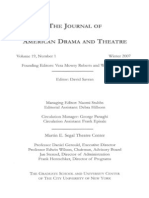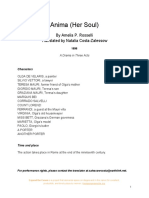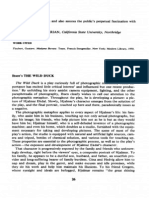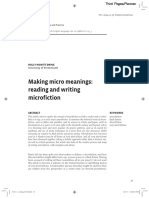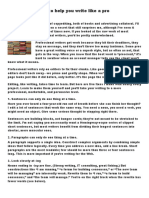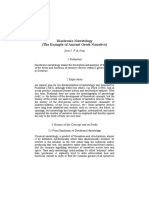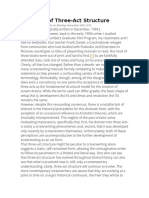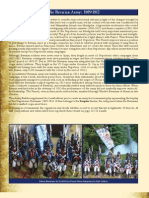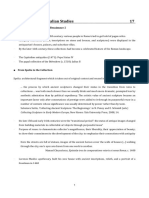Professional Documents
Culture Documents
Ten Minute Play
Ten Minute Play
Uploaded by
nueva_madre0 ratings0% found this document useful (0 votes)
297 views3 pagesThe document provides advice for writing effective 10-minute plays by identifying common issues seen in unsuccessful short plays. These issues include plays that take too long to set up their conflict, use characters as mouthpieces to convey a message rather than having them drive the plot, fail to move the story or characters forward meaningfully, focus on a single joke or gimmick at the expense of character development and plot, try to incorporate too many themes, or lack an original idea and rely on clichéd characters and situations. The author encourages writers to establish the central conflict quickly, have characters face real stakes that change them, ensure dialogue propels the story, focus on a single storyline, and bring a fresh perspective to avoid plays feeling overly
Original Description:
micro teatro
Copyright
© © All Rights Reserved
Available Formats
DOCX, PDF, TXT or read online from Scribd
Share this document
Did you find this document useful?
Is this content inappropriate?
Report this DocumentThe document provides advice for writing effective 10-minute plays by identifying common issues seen in unsuccessful short plays. These issues include plays that take too long to set up their conflict, use characters as mouthpieces to convey a message rather than having them drive the plot, fail to move the story or characters forward meaningfully, focus on a single joke or gimmick at the expense of character development and plot, try to incorporate too many themes, or lack an original idea and rely on clichéd characters and situations. The author encourages writers to establish the central conflict quickly, have characters face real stakes that change them, ensure dialogue propels the story, focus on a single storyline, and bring a fresh perspective to avoid plays feeling overly
Copyright:
© All Rights Reserved
Available Formats
Download as DOCX, PDF, TXT or read online from Scribd
Download as docx, pdf, or txt
0 ratings0% found this document useful (0 votes)
297 views3 pagesTen Minute Play
Ten Minute Play
Uploaded by
nueva_madreThe document provides advice for writing effective 10-minute plays by identifying common issues seen in unsuccessful short plays. These issues include plays that take too long to set up their conflict, use characters as mouthpieces to convey a message rather than having them drive the plot, fail to move the story or characters forward meaningfully, focus on a single joke or gimmick at the expense of character development and plot, try to incorporate too many themes, or lack an original idea and rely on clichéd characters and situations. The author encourages writers to establish the central conflict quickly, have characters face real stakes that change them, ensure dialogue propels the story, focus on a single storyline, and bring a fresh perspective to avoid plays feeling overly
Copyright:
© All Rights Reserved
Available Formats
Download as DOCX, PDF, TXT or read online from Scribd
Download as docx, pdf, or txt
You are on page 1of 3
Ten Minute Play
1) It takes too long to get going. In a ten-minute play,
audiences should know or at least suspect what the conflict is by
page two. Very often, there is a lot of introductory and lead-up
dialogue before the story actually starts on page four or five.
This means it’s actually a five-minute play with a bunch of filler
up front. Four or five pages in a ten-minute play is too much to
waste.
Inciting Event
2) The characters are mouthpieces. The play has a message it
wants to impart, but rather than putting characters in a dramatic
situation to impart it, the characters (usually two) are plopped in
some neutral locale, where the intended subject randomly comes
up, and they discuss the two sides of the message point by point
(or close enough). It doesn’t matter who wins or loses the
argument, nobody leaves the argument changed, and the result
feels like heavy-handed preaching. It’s conflict without stakes.
3) The play goes nowhere. Writing dialogue can be really fun,
especially when the characters take over and say things we never
expected them to say. But when they’re done having free rein,
it’s important to go back over what they said and make sure
there are sound reasons for keeping it. Does the dialogue move
the story forward and drive toward the ending? Does it
contribute to the theme? Does it reveal their wants? If that
information were not in the play, would it make a difference?
Despite clever dialogue, do the characters end in the same place
they began? Even ten-minute plays should show a journey for
someone. (Facebook commenter Tom Rushen adds that this is
often a problem when the “play” is an excerpt from a larger
piece, and has no impact out of context.)
5) The play is an elaborate set-up for the punchline. Some
ten-minute plays read as though the ending was thought of first,
and the entire play was written to support that punchline. This
isn’t to say the ending is bad, just that it needs a solid structure
to support and make it earned and satisfying. Very often, with
plays like this, the ending is telegraphed because it seems as if
it’s the only point to the play. Alternatively,
6) The play is a one-trick pony. There’s a device, say a
daughter is coming out as straight to her lesbian parents, and
they are disappointed. Instead of focusing on the discourse that
might come out of that, and the acceptance journey or something
else dramatic, the play is focused on all the reversals that come
out of that reveal, at the expense of the characters, the plot, and
the play itself. Even if it’s funny, the joke is usually exhausted
long before the ten minutes is up, which is why sketches tend
toward brevity and often peter out without resolving the conflict
in any meaningful way.
7) The play tries to do too much. One of the beautiful things
about writing ten-minute plays is that there is only room for one
storyline. That doesn’t mean there can’t be subtlety and
beautiful layers to that story, but in trying to incorporate too
many themes, the ten-minute play becomes unfocused and
confusing. With a solid throughline, supporting ideas may
manifest, but there isn’t room for them to be a story unto
themselves.
8) There’s not an original idea in it. Some plays are perfectly
fine as written, but the whole thing just feels too familiar, the
characters too cliche. I’d offer examples but I don’t want to call
out something specific that somebody might take personally. A
short time ago, I posted on Official Playwrights of Facebook
asking if ten-minute plays time out, i.e. do they become less
appealing for some reason? I think this may actually be part of
it. When I wrote a short play about people being obsessed with
technology, it got produced about 15 times in one year; nobody
chooses it now. I’m guessing there are how a ton of those out
there; maybe you’ve written one yourself. So if something
“new” like that can get overdone, imagine how many times
readers see things about ordinary situations. If you’re choosing
to write about something ordinary, ask yourself “What is going
to make this one different from all the others like it?”
ARCO
Personaje cambio
Deso/necesidad
Ser simple
You might also like
- Blue OrangeDocument1 pageBlue OrangeLuka Romanov0% (1)
- Strategic Human Resource Management McqsDocument40 pagesStrategic Human Resource Management McqsMohit Grover75% (52)
- Screenwriting Managers List 2Document43 pagesScreenwriting Managers List 2nueva_madreNo ratings yet
- Marivaux - Careless VowsDocument38 pagesMarivaux - Careless VowslidiaglassNo ratings yet
- Jaime Amparo Alves - The Anti-Black City - Police Terror and Black Urban Life in Brazil-University of Minnesota Press (2018) PDFDocument334 pagesJaime Amparo Alves - The Anti-Black City - Police Terror and Black Urban Life in Brazil-University of Minnesota Press (2018) PDFDiogo Marcal CirqueiraNo ratings yet
- Edward AlbeeDocument2 pagesEdward Albeedrama101spscc0% (3)
- Edward Albee, The Art of Theater No. 4Document19 pagesEdward Albee, The Art of Theater No. 4Bogdan Theodor OlteanuNo ratings yet
- BaleyDocument47 pagesBaleyYvonne KayNo ratings yet
- Notes On A Scandal (Film)Document7 pagesNotes On A Scandal (Film)Ashish JindalNo ratings yet
- The FighterDocument8 pagesThe Fighterbhargav470No ratings yet
- Saddik, Annette J.Document194 pagesSaddik, Annette J.Nudzejma DurmisevicNo ratings yet
- JADT Vol19 n1 Winter2007 Lee Having Favorini BarriosDocument100 pagesJADT Vol19 n1 Winter2007 Lee Having Favorini BarriossegalcenterNo ratings yet
- Anima (Her Soul) (Amelia Rosselli) PDFDocument63 pagesAnima (Her Soul) (Amelia Rosselli) PDFRyan KenneyNo ratings yet
- Simion GrayDocument3 pagesSimion GrayIlinca NataliaNo ratings yet
- Hershey'S QSPM Matrix: Strategies 1 Key Internal Factors Weights AS StrengthsDocument7 pagesHershey'S QSPM Matrix: Strategies 1 Key Internal Factors Weights AS StrengthsSofiaNo ratings yet
- Contoh Tata Ibadah HKBP - Bahasa InggrisDocument10 pagesContoh Tata Ibadah HKBP - Bahasa InggrisMarshinta Valentine100% (2)
- Chucho Valdez ThesisDocument47 pagesChucho Valdez ThesisMaria Angelica Varela La Madrid100% (2)
- A Marriage Proposal - ChekhovDocument9 pagesA Marriage Proposal - Chekhovujjwal2110No ratings yet
- CEN KM JournalDocument23 pagesCEN KM JournalAlina MasgrasNo ratings yet
- Trip To BountifulDocument4 pagesTrip To BountifulConor Patrick Finnerty-EsmondeNo ratings yet
- A Doll's House - A Critical IntroductionDocument20 pagesA Doll's House - A Critical IntroductionAadivya RaushanNo ratings yet
- Parks - Harrison David RiversDocument90 pagesParks - Harrison David RiversMakari Robinson-McNeeseNo ratings yet
- Sure ThingDocument4 pagesSure ThingAaron TreadwayNo ratings yet
- Deadly TheatreDocument2 pagesDeadly TheatreGautam Sarkar100% (1)
- Edward Albee and His Mother Characters: An Analysis of Selected PlaysDocument5 pagesEdward Albee and His Mother Characters: An Analysis of Selected PlaysInternational Organization of Scientific Research (IOSR)No ratings yet
- BlackbirdDocument4 pagesBlackbirdapi-3083287350% (2)
- AntigoneDocument37 pagesAntigoneMike FoxNo ratings yet
- Who's Afraid of Virginia Woolf Study Guide PDFDocument25 pagesWho's Afraid of Virginia Woolf Study Guide PDFkevnekattNo ratings yet
- Oscar Wilde - The Importance of Being EarnestDocument62 pagesOscar Wilde - The Importance of Being EarnestDanica SpasicNo ratings yet
- It at Least-I: As SHEDocument4 pagesIt at Least-I: As SHEjoseph YattaNo ratings yet
- Moonfleece PDFDocument43 pagesMoonfleece PDFSteph BrooksNo ratings yet
- In Mother Words ScriptDocument75 pagesIn Mother Words ScriptmaifathyNo ratings yet
- The Zoo Story - Juni ZarlinaDocument2 pagesThe Zoo Story - Juni ZarlinaJuni Zarlina0% (1)
- The Shades of OrcusDocument75 pagesThe Shades of OrcusCole BuzbeeNo ratings yet
- Eng DramaDocument76 pagesEng DramaAndy AngelNo ratings yet
- Lita3 Love Through The Ages: How To Write The Essay (This Method Is Tried and Tested With 99.9% Effectiveness. I Think.)Document4 pagesLita3 Love Through The Ages: How To Write The Essay (This Method Is Tried and Tested With 99.9% Effectiveness. I Think.)Drew Malcolm GoldsmithNo ratings yet
- Parents CocteauDocument7 pagesParents CocteauDámaris VeraNo ratings yet
- Medea by EuripidesDocument62 pagesMedea by EuripidesKatrina JackmanNo ratings yet
- All My Sons by Arthur MillerDocument1 pageAll My Sons by Arthur MillerwpK50% (4)
- Neva EnglishDocument63 pagesNeva EnglishJosephine NunezNo ratings yet
- The Purpose and Effects of Metatheatre in ShakespeareDocument4 pagesThe Purpose and Effects of Metatheatre in ShakespeareMichael HaaseNo ratings yet
- Henrik Ibsen - Plays and ProblemsDocument398 pagesHenrik Ibsen - Plays and Problemsariha raheeNo ratings yet
- DRAMA 101 - Playwright - Tracy LettsDocument2 pagesDRAMA 101 - Playwright - Tracy Lettsdrama101spsccNo ratings yet
- About Pinters BetrayalDocument33 pagesAbout Pinters BetrayalДаниил ЕрохинNo ratings yet
- Rosita PDFDocument65 pagesRosita PDFshamidartiiNo ratings yet
- Maria Irene FonresDocument6 pagesMaria Irene FonresNoelle SpitzNo ratings yet
- Menander - DyskolosDocument33 pagesMenander - DyskolosPfei86No ratings yet
- The Wild DuckDocument4 pagesThe Wild DuckMahmoud Radwan100% (1)
- The Libertine - Prologue (Rochester's Monologue) PDFDocument1 pageThe Libertine - Prologue (Rochester's Monologue) PDFPranav ViswanathanNo ratings yet
- Interview Maria Irene FornesDocument7 pagesInterview Maria Irene FornesAlejandro James D'AbreauNo ratings yet
- Study Guide: Prepared by Kimberly Colburn Production Dramaturg & Assistant Literary ManagerDocument16 pagesStudy Guide: Prepared by Kimberly Colburn Production Dramaturg & Assistant Literary ManagerTanishq RajNo ratings yet
- Attempts On Her Life 2017 InternetDocument30 pagesAttempts On Her Life 2017 Internet5ara_bluesnow100% (1)
- Real Thing ProgramDocument6 pagesReal Thing ProgramRay RenatiNo ratings yet
- Six Characters Looking For An AuthorDocument32 pagesSix Characters Looking For An AuthorMonika ValkunaiteNo ratings yet
- MACHINAL PresenationDocument5 pagesMACHINAL PresenationEftichia SpyridakiNo ratings yet
- Gale Researcher Guide for: Maria Irene Fornés and Multispatial TheaterFrom EverandGale Researcher Guide for: Maria Irene Fornés and Multispatial TheaterNo ratings yet
- Ualr Waiting RoomDocument6 pagesUalr Waiting Roomapi-242221461No ratings yet
- Making Micro Meanings: Reading and Writing Microfiction: Holly Howitt-DringDocument12 pagesMaking Micro Meanings: Reading and Writing Microfiction: Holly Howitt-Dringnueva_madreNo ratings yet
- How To Write A 10-Minute Play - Kevin CraigDocument3 pagesHow To Write A 10-Minute Play - Kevin Craignueva_madreNo ratings yet
- Three Steps To Script-Editing SuccessDocument2 pagesThree Steps To Script-Editing Successnueva_madreNo ratings yet
- Intelligent Screenplay Development - Filmmaker MagazineDocument12 pagesIntelligent Screenplay Development - Filmmaker Magazinenueva_madreNo ratings yet
- How To Write A 10-Minute Play - Sam GraberDocument5 pagesHow To Write A 10-Minute Play - Sam Grabernueva_madreNo ratings yet
- Death To Readers - by Terry RossioDocument6 pagesDeath To Readers - by Terry Rossionueva_madreNo ratings yet
- 10.1 Dramaturgies of SpontaneityDocument23 pages10.1 Dramaturgies of Spontaneitynueva_madreNo ratings yet
- 5 Editor's Secrets To Help You Write Like A Pro - Remarkable CommunicationDocument2 pages5 Editor's Secrets To Help You Write Like A Pro - Remarkable Communicationnueva_madreNo ratings yet
- Searching For Storiness - Story-Generation From A Reader's PerspectiveDocument7 pagesSearching For Storiness - Story-Generation From A Reader's Perspectivenueva_madreNo ratings yet
- Narrativity and Creativity in Oral Storytelling - Co-Constructing A Story With The AudienceDocument21 pagesNarrativity and Creativity in Oral Storytelling - Co-Constructing A Story With The Audiencenueva_madreNo ratings yet
- 5 Detalles Básicos en Los Que Se Fijan Los Lectores de GuionesDocument12 pages5 Detalles Básicos en Los Que Se Fijan Los Lectores de Guionesnueva_madreNo ratings yet
- Breaking Into Script Reading, 2 Day Workshop With Lucy V Hay - London Screenwriters' Festival PDFDocument7 pagesBreaking Into Script Reading, 2 Day Workshop With Lucy V Hay - London Screenwriters' Festival PDFnueva_madreNo ratings yet
- DiachronicNarratologyLHNDocument8 pagesDiachronicNarratologyLHNnueva_madreNo ratings yet
- "Female Protagonist" Movies How To Cope With A Female Bully BossDocument1 page"Female Protagonist" Movies How To Cope With A Female Bully Bossnueva_madreNo ratings yet
- Interrogating Writing Practices PerspectDocument10 pagesInterrogating Writing Practices Perspectnueva_madreNo ratings yet
- A History of Three ActsDocument14 pagesA History of Three Actsnueva_madreNo ratings yet
- Aristotle and Hollywood. Dramatic Structure PDFDocument6 pagesAristotle and Hollywood. Dramatic Structure PDFnueva_madreNo ratings yet
- Top 50Document2 pagesTop 50Jabari LeeNo ratings yet
- GST 122 - Dr. UbaidallahDocument3 pagesGST 122 - Dr. UbaidallahOJOMO DANIELNo ratings yet
- A10-DG-Palo Alto Networks Joint Firewall Load Balancing SolutionDocument33 pagesA10-DG-Palo Alto Networks Joint Firewall Load Balancing SolutionHenry Flores SolisNo ratings yet
- 21.a OSG Vs Ayala Land Et - AlDocument2 pages21.a OSG Vs Ayala Land Et - AlMarion JossetteNo ratings yet
- 7AN17DVWB0622 - Devoir 6Document5 pages7AN17DVWB0622 - Devoir 6aintnojeshNo ratings yet
- Bavarian ListDocument2 pagesBavarian Listgeiraa100% (1)
- 10 Simple Steps On How To Start An Online Grocery Business V3.0Document17 pages10 Simple Steps On How To Start An Online Grocery Business V3.0bernbilazonNo ratings yet
- 9-11: Was There An Alternative? - EXCERPTDocument13 pages9-11: Was There An Alternative? - EXCERPTSeven Stories Press0% (2)
- Emata v. IAC, G.R. No. L-72714, June 29, 1989Document4 pagesEmata v. IAC, G.R. No. L-72714, June 29, 1989Alan Vincent FontanosaNo ratings yet
- Loss of Thing DueDocument3 pagesLoss of Thing DueaileenrconcepcionNo ratings yet
- Information Theory and Evolution 3Rd Edition John Avery Full ChapterDocument52 pagesInformation Theory and Evolution 3Rd Edition John Avery Full Chapterchristopher.perez844100% (11)
- Training Theories - ATG Online CoachingDocument3 pagesTraining Theories - ATG Online CoachingWantong LaoNo ratings yet
- Pakistan Studies (2059/1) Paper 1 Marking Scheme Oct/Nov 2019Document19 pagesPakistan Studies (2059/1) Paper 1 Marking Scheme Oct/Nov 2019Syed Hammad Hamid0% (2)
- Virgin Offshore Chapter 11 Reorp Plan 1-31-13 PDFDocument44 pagesVirgin Offshore Chapter 11 Reorp Plan 1-31-13 PDFlonghorn4lifNo ratings yet
- Smart Cities and Digital Inclusion-Concept NoteDocument8 pagesSmart Cities and Digital Inclusion-Concept Noteapi-365514575No ratings yet
- Far QuizDocument7 pagesFar QuizMeldred EcatNo ratings yet
- Strategic HRM MGRCM2011: Professor Peter TurnbullDocument2 pagesStrategic HRM MGRCM2011: Professor Peter TurnbullmiimNo ratings yet
- Dubai Islamic Bank Dubai Islamic Bank Dubai Islamic Bank Dubai Islamic BankDocument2 pagesDubai Islamic Bank Dubai Islamic Bank Dubai Islamic Bank Dubai Islamic BankKhurram MalikNo ratings yet
- Sagar Wright - Investment Search ServicesDocument7 pagesSagar Wright - Investment Search ServicesJames CravenNo ratings yet
- Petition For ReviewDocument18 pagesPetition For ReviewJay ArNo ratings yet
- Labor Market Discrimination: Discrimination by Employer, Customer, and EmployeeDocument50 pagesLabor Market Discrimination: Discrimination by Employer, Customer, and Employeekapila aroraaNo ratings yet
- Danico Mastur Adiwinata Moch Dzulkirom AR Muhammad Saifi: Danicomasturadiwinata@yahoo - Co.idDocument7 pagesDanico Mastur Adiwinata Moch Dzulkirom AR Muhammad Saifi: Danicomasturadiwinata@yahoo - Co.idMuhamad FazaresNo ratings yet
- Virjinia Woolf As A NovelisttDocument3 pagesVirjinia Woolf As A NovelisttSaba HanifNo ratings yet
- Risk Plan Shard London Team 3 Saniya Sabina Swapneel Pooja 2Document13 pagesRisk Plan Shard London Team 3 Saniya Sabina Swapneel Pooja 2محمد عثمانNo ratings yet
- STIS17Document4 pagesSTIS17Hansoo KimNo ratings yet











